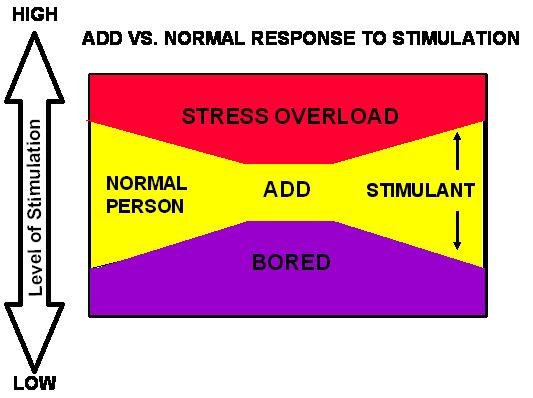ADHD is a personality type that is determined mainly by genetics. Survival of the group is enhanced by variability of its members. We wouldn’t want everyone to be the same. Ancient tribes for example, needed a look-out person who could patiently maintain watch in case something happened. That wouldn’t be an ADD person. The ADD person needs much more stimulation.
The diagram shows the range of stimulation within which everyone functions. You are excited at the higher end and relaxed at the lower end. Everyone also has a level of stimulation below which they are bored and above which they are overstressed. People with ADHD tend to have a problem at both ends. They need higher stimulation than normal people and are stressed more easily. They have trouble separating important from unimportant and tend to have too much on their mind.
Stimulants help both problems. They turn on the brain to enable concentration on the lower level stimuli. They also allow focus on one thing at a time, which helps the ADD person to be less hyper and more relaxed.
If a kid with ADD is playing baseball and you put him in the outfield, when the ball is hit to him you may ask – where is he? The kid with ADD can’t pay attention in case something happens. He may be digging a hole, or playing with stuff in his pocket or visiting with someone on the side-lines. This inability to focus and separate the important from the unimportant is also seen in schoolwork (and in the case of adults, paperwork).
Boredom with routine is related to inadequate dopamine levels in the part of the brain that controls drive and motivation. Easy distractibility is related to inadequate norepinephrine in the brain cortex. Impulsivity is related to inadequate dopamine in the cortex.
ADD people focus on things that are interesting rather than things that are important. They need action. They are often the explorers, innovators and challengers in our world.
test.askdrjones.com/2007/07/16/vyvanse-new-treatment-for-adhd/

